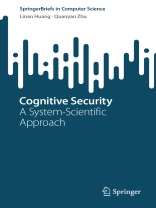This book presents the latest research in cognitive security, a rapidly emerging field that addresses the vulnerabilities in human behavior and cognition that can lead to Cyber-Physical Systems (CPS) compromise. This book demonstrates that as adversaries increasingly use manipulative and deceptive information to disrupt human cognitive processes, including sensation, attention, memory, and mental operations, humans are misled into fallacious reasoning and manipulated decisions that can lead to system-level meltdown. Cognitive security aims to protect humans from the exploitation of cognitive vulnerabilities, help them make informed decisions that are free from manipulation and undue influence, and mitigate the aggravating risk in the ensuing steps of the attacker’s kill chain.
This book offers solutions that work across different fields, such as psychology, neuroscience, data science, social science, and game theory, to deal with cognitive threats. It guides the reader through the core ideas with figures, real-life examples, and case studies. Moreover, it formally defines all research questions, presents the results using mathematical theorems and proofs, and obtains insights through numerical validation.
This book provides a self-contained and brief overview of essential system-scientific tools for modeling, analyzing, and mitigating cognitive vulnerabilities. The concepts of human cognitive capacities and cognitive vulnerabilities are formally discussed, followed by two case studies in the scenarios of reactive and proactive attention vulnerabilities. This book provides insights and applications on this transdisciplinary topic, with the goal of motivating future research in this emerging area and pushing the frontier of human-technology convergence. This book is a valuable reference for researchers and advanced-level students studying or working in cognitive security and related fields. It is also useful for decision-makers, managers, and professionals working within these related fields.
Tabela de Conteúdo
Chapter. 1. Introduction.- Chapter. 2. System-Scientific Methods.- Chapter. 3. Cognitive Capacities for Designing, Operating, Supervising, and Securing Complex Systems.- Chapter. 4. Review of System-Scientific Perspectives for Analysis, Exploitation, and Mitigation of Cognitive Vulnerabilities.- Chapter. 5. ADVERT: Defending against Reactive Attention Attacks.- Chapter. 6. RADAMS: Defending against Proactive Attention Attacks.- Chapter. 7. Summary and Conclusions.
Sobre o autor
Linan Huang received the B.Eng. degree (Hons.) in Electrical Engineering from Beijing Institute of Technology, China, in 2016 and the Ph.D. degree in electrical engineering from New York University (NYU), Brooklyn, NY, USA, in 2022. He is currently an assistant researcher at Tsinghua University. He is a recipient of many awards, including the 2022 Dante Youla Award for graduate research excellence, the best paper award at the 2022 Game Sec conference, and the 2022 INFORMS MAS Koopman Prize. His research interests include dynamic decision-making in the multi-agent system, mechanism design, artificial intelligence, security, and resilience for cyber-physical systems.
Quanyan Zhu received B. Eng. in Honors Electrical Engineering from Mc Gill University in 2006, M. A. Sc. from the University of Toronto in 2008, and Ph.D. from the University of Illinois at Urbana-Champaign (UIUC) in 2013. After stints at Princeton University, he is currently an associate professor atthe Department of Electrical and Computer Engineering, New York University (NYU). He is an affiliated faculty member of the Center for Urban Science and Progress (CUSP) and Center for Cyber Security (CCS) at NYU. He is a recipient of many awards, including NSF CAREER Award, NYU Goddard Junior Faculty Fellowship, NSERC Postdoctoral Fellowship (PDF), NSERC Canada Graduate Scholarship (CGS), and Mavis Future Faculty Fellowships. He spearheaded and chaired INFOCOM Workshop on Communications and Control on Smart Energy Systems (CCSES), Midwest Workshop on Control and Game Theory (WCGT), and ICRA workshop on Security and Privacy of Robotics. His current research interests include game theory, machine learning, cyber deception, network optimization and control, smart cities, Internet of Things, and cyber-physical systems. He has served as the general chair or the TPC chair of the 7th and the 11th Conference on Decision and Game Theory for Security (Game Sec) in 2016 and 2020, the 9th International Conference on NETwork Games, COntrol and OPtimisation (NETGCOOP) in 2018, the 5th International Conference on Artificial Intelligence and Security (ICAIS 2019) in 2019, and 2020 IEEE Workshop on Information Forensics and Security (WIFS). He is a co-author of four recent books published by Springer: Cyber-Security in Critical Infrastructures: A Game-Theoretic Approach (with S. Rass, S. Schauer, and S. König), A Game- and Decision-Theoretic Approach to Resilient Interdependent Network Analysis and Design (with J. Chen), Cross-Layer Design for Secure and Resilient Cyber-Physical Systems: A Decision and Game Theoretic Approach(with Z. Xu), Game Theory for Cyber Deception (with J. Pawlick).












